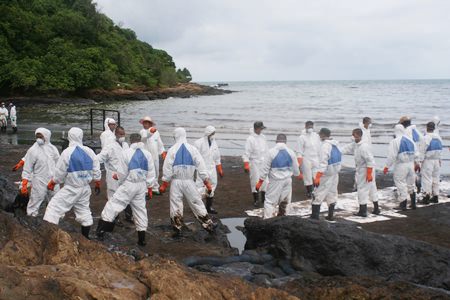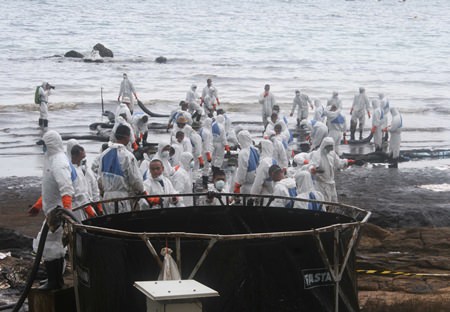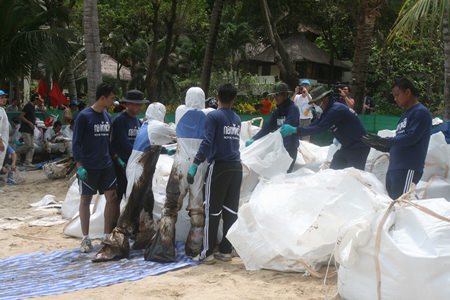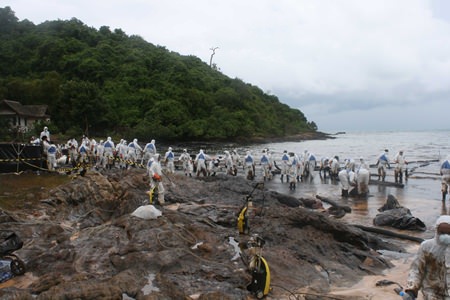Cleanup of the Koh Samet oil spill is winding down, but the more-arduous process of assessing long-term damage and preventing future spills is only beginning.
Even as 900 PTT Global Chemical Plc workers, Royal Thai Navy personnel and volunteers mopped up and hauled away sand polluted by the July 27 spill, government, military, environmental and tourism officials moved to determine how much damage was done by the spillage of 50,000 liters of crude oil from a PTTGC floating pipe off the Rayong coast.
The black waves that washed across Phrao Bay have cleared, but traces of oil remain not only there, but the adjacent Suanson, Hinkhao, Khao Laemyai and Mae Rumphung beaches. Workers ensconced in sweaty biohazard suits sprayed high-pressure hoses on rocks, mopped up oil puddles by hand and wiped down what remained. Teams from the Rayong Public Health Office stood by ready to provide first aid.
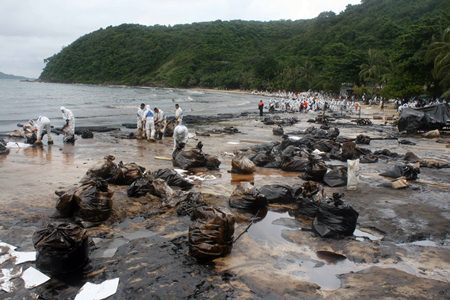 PTT Global Chemical Plc workers, Royal Thai Navy personnel and volunteers mop up and haul away sand polluted by the July 27 oil spill.
PTT Global Chemical Plc workers, Royal Thai Navy personnel and volunteers mop up and haul away sand polluted by the July 27 oil spill.
PTT has hauled away much of the affected sand, taking it to Maptaput facilities for treatment and disposal. Meanwhile, company divers have been inspecting coral reefs and sea beds for contamination. Paragliders are cruising above the waves looking for remaining slicks and five PTT boats have laid booms and chemically sprayed any lingering patches.
While the worst has passed, no one honestly can predict what the long-term effects will be or how long they’ll last. The navy’s Eastern Marine Fisheries Research and Development Center has begun collecting fish and aquatic animals to check contamination. The Marine Department, meanwhile, is proceeding with damage assessment and rehabilitation to western Koh Samet.
The department reported that initial tests showed 9.6 mg. of oil per liter, below the safety standard of 15 mg. per liter. Initial tests on seafood show no contamination. If additional test results prove equally rosy, Phrao Bay will be reopened soon, officials said.
Tests won’t stop there, however. The Pollution Control Department said it will check the quality of seawater and air around Khao Laem Ya-Mu Koh Samet National Park for one year. One concern? PTTGC used six times the amount of chemical dispersant allowed to break up the 1.5-nautical mile slick.
Media reports indicate PTTGC used more than 32,000 liters of chemicals, but was only given permission by the Pollution Control Department to use 5,000 liters. The company won’t have to worry about sanction, though, as Thai law provides no penalty for breaking PCD directives. But fishermen worry the oil and chemicals will combine to devastate the local marine population.
The Natural Resources and Environment Ministry has begun monitoring short- and long-term impacts from imports of oil spilt in the marine ecosystem. Interviews with local fishermen have also begun.
Management for the entire PTT Group has vowed to improve its oil transportation network and facilities, instructing its many subsidiary companies to closely monitor and inspect facilities and improve communication minimize accidents. The first step, the company said, will be to replace the floating hose that leaked during a tanker transfer to PTT’s Maptaput refinery.
PTT also acknowledged it has begun paying settlements to Rayong and Koh Samet residents before any compensation lawsuits can be filed. Some of those payments may be to offset the damage done to Koh Samet’s tourism industry, which earns 16 billion baht a year from 5.5 million visitors.
The island plans to host a “big cleanup day” Aug 10 to regain tourist confidence and will bring 25 prominent travel agents and the media to the affected area to gauge the progress for themselves. The Tourism Authority of Thailand, meanwhile, said 70 percent of the island’s hotel rooms were booked as of Aug. 2 and asserted that no beaches outside of Phrao Bay were affected.
TAT’s claims contradicted international media reports of mass checkouts and a public quote from Thailand’s top tourism official.
“I’m very concerned,” Tourism and Sports Minister Somsak Pureesrisak told reporters. “I didn’t think this spill would impact tourism in such an extreme way.”
